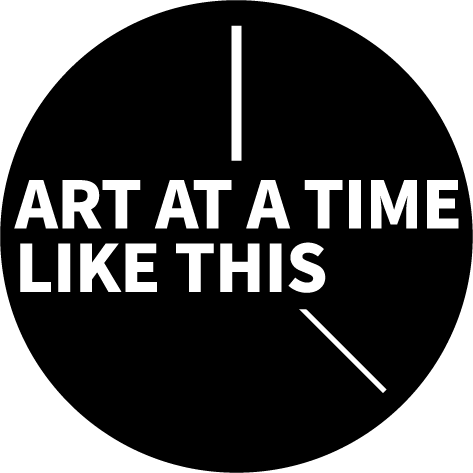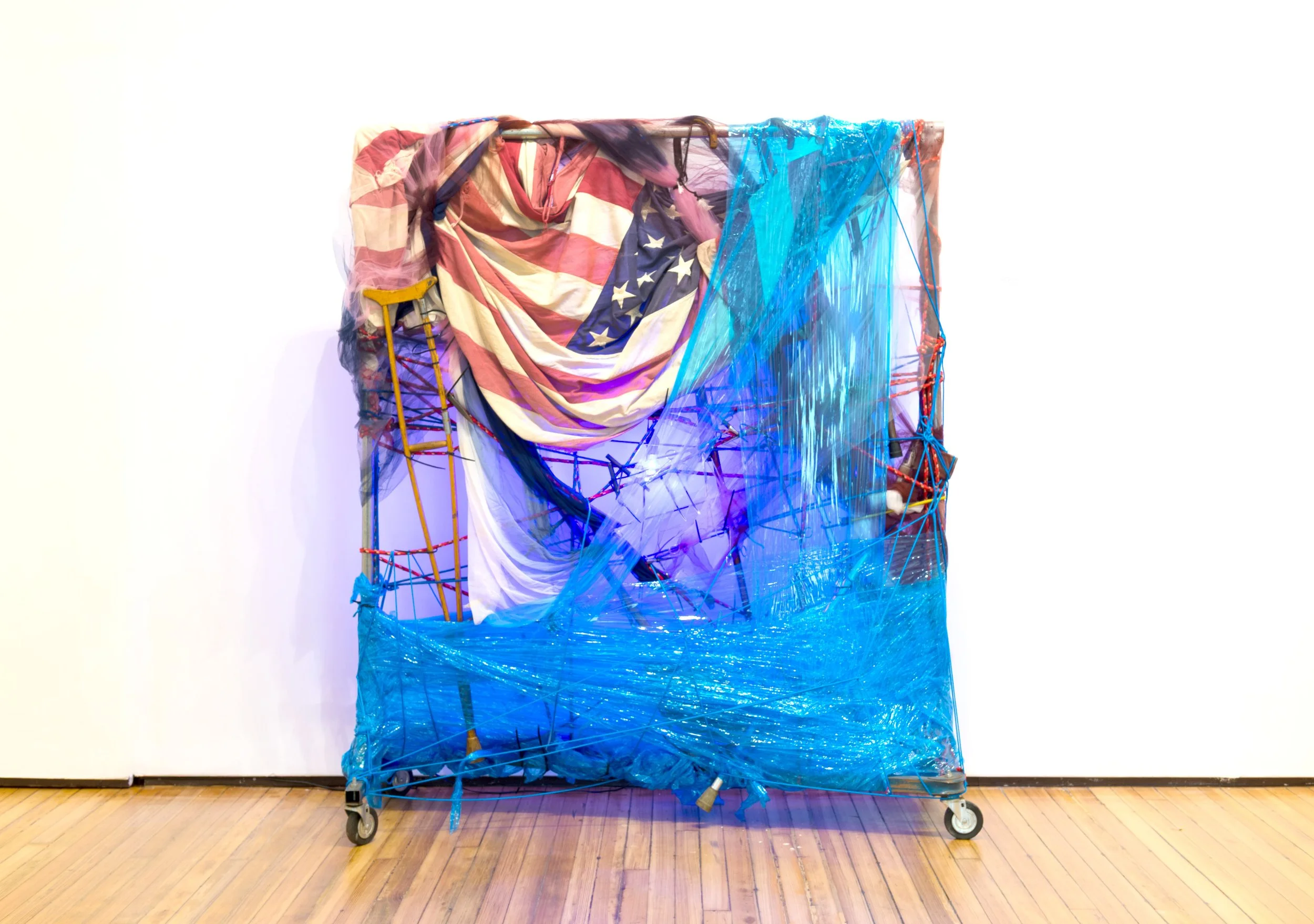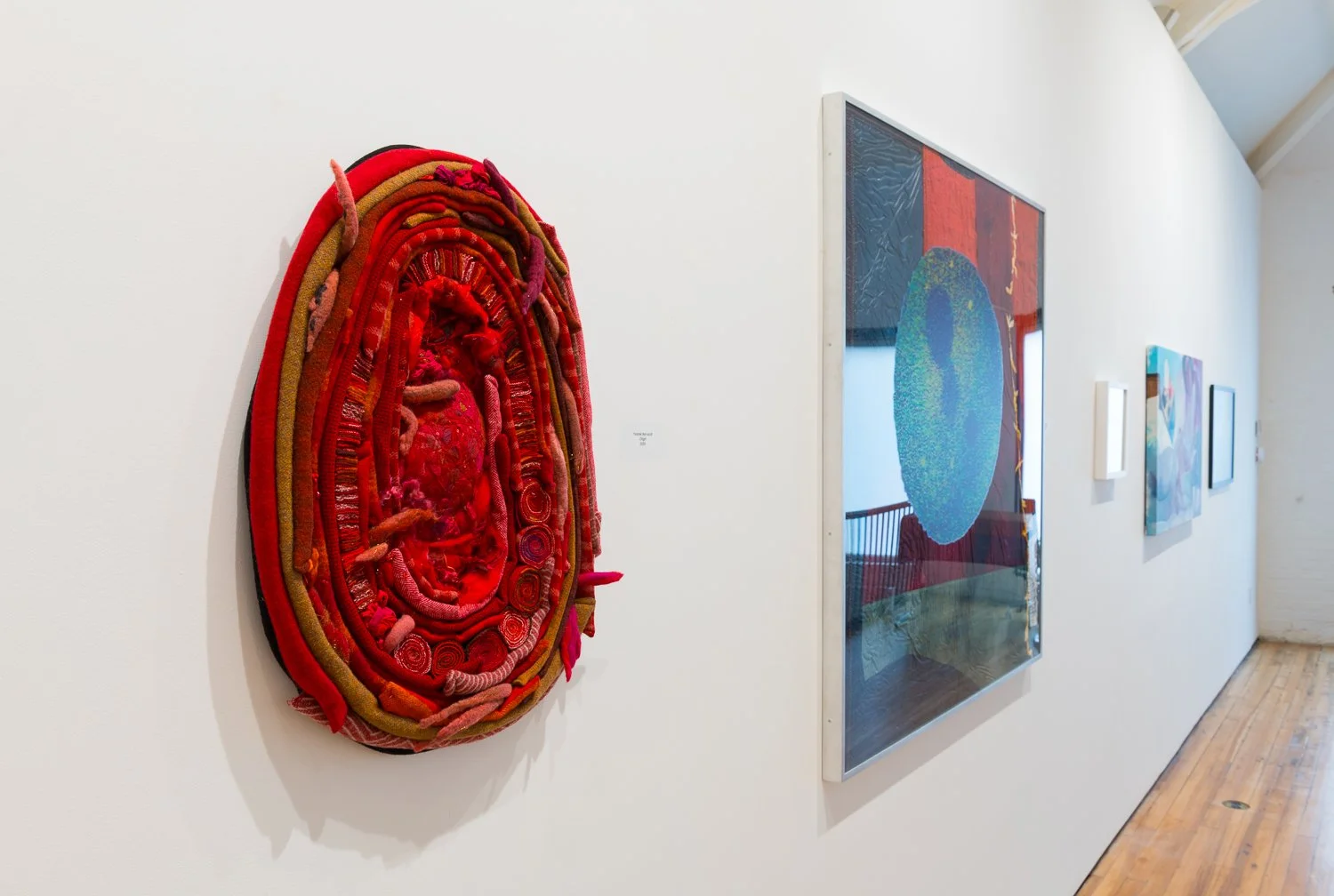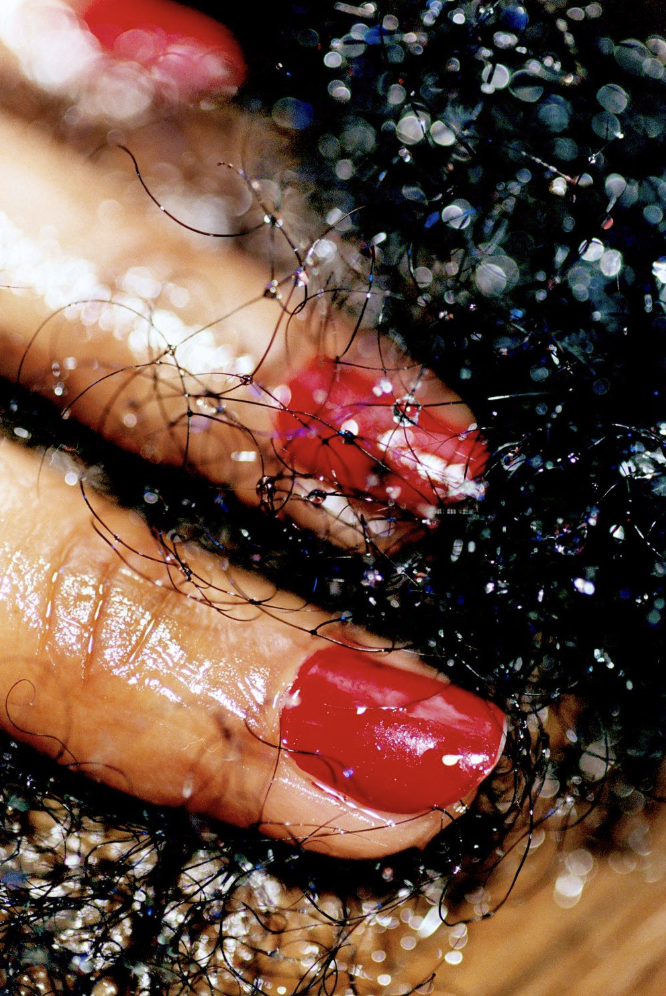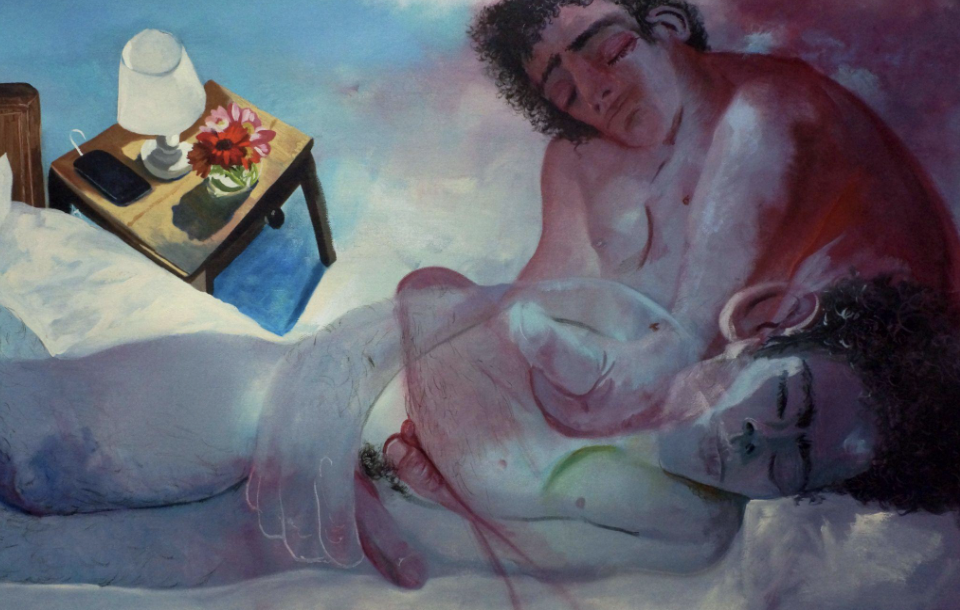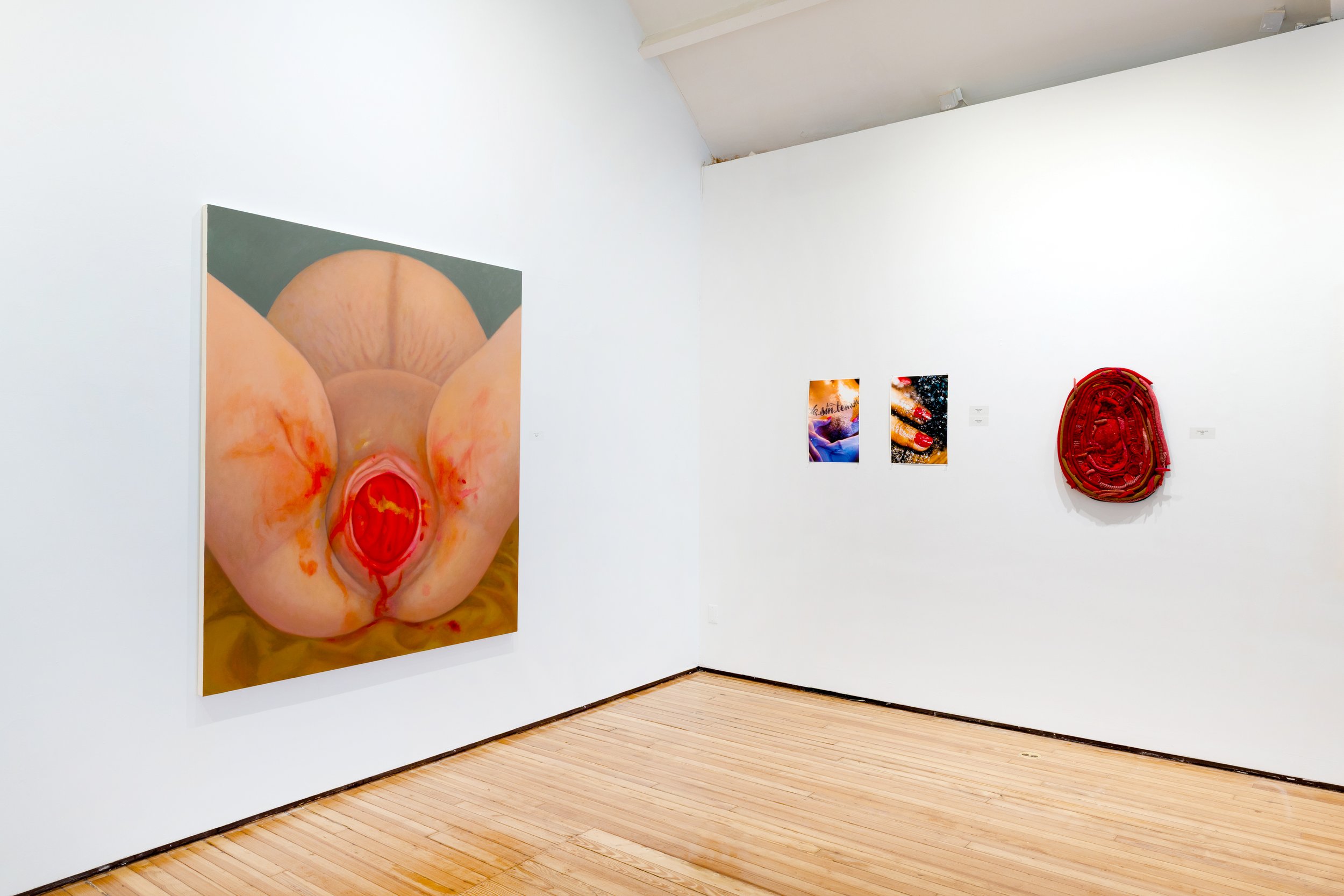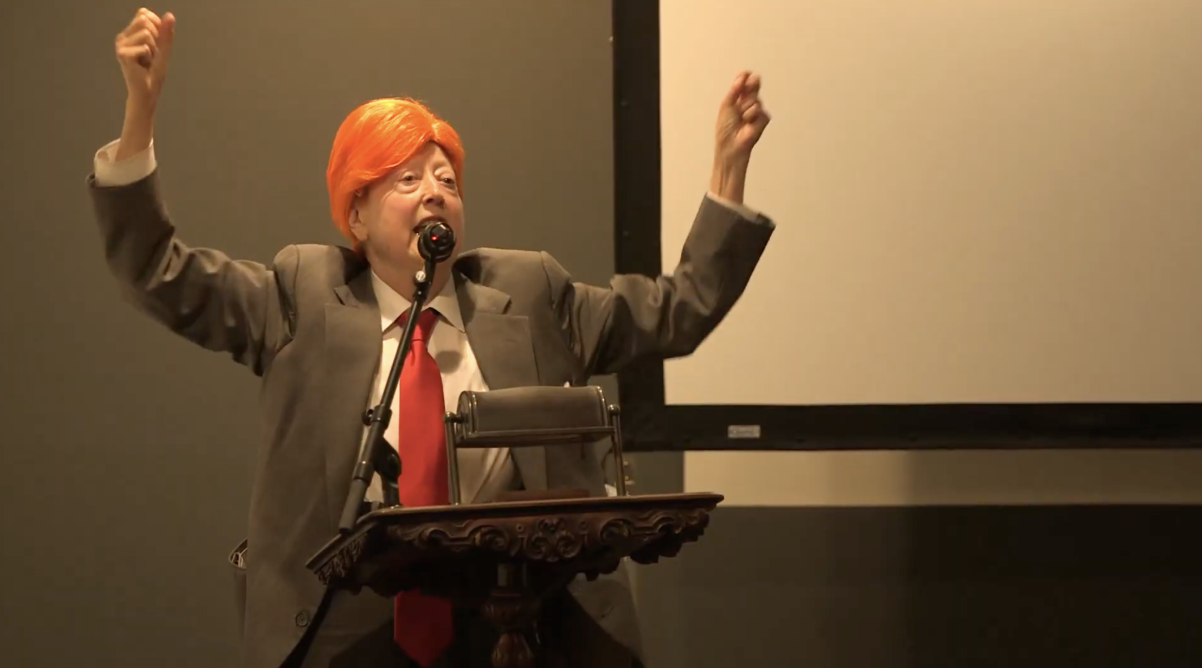DON’T LOOK NOW:
A Defense Of Free Expression
Exhibition on view October 10-25, 2025
Tuesday through Saturday, 12-6 pm
127 Elizabeth Street, New York
Art at a Time Like This is proud to announce its first gallery exhibition, DON’T LOOK NOW featuring artists and artwork encountering censorship in the United States in recent years. This exhibition highlights the precarious state of our first amendment rights and gives the public a chance to find out for themselves what they are not permitted to see.
Artists on View:
Evan Apodaca, Leopoldo Bloom, Margarita Cabrera, Mel Chin, Abigail DeVille, Tamar Ettun, Shepard Fairey, Andil Gosine, Clarity Haynes, Yvonne Iten-Scott, Alex Jochim, Sari Nordman, Katrina Majkut, Jean-Paul Mallozzi, Jessica Doe, Vũ H. Khánh Nguyên, Shey Ri Acu Rivera Ríos, Dread Scott, Danielle SeeWalker, Susan Silas, Kelly Sinnapah Mary, Marilyn Minter, Ali Syverson, Michelle Talibah, Spencer Tunick, and Martha Wilson.
Plus a video produced by Don't Delete Art with artists silenced by social media ban, including:
Alphachanneling, Elsa Marie Keefe, Emma Shapiro, Eva Mueller, Jarid Blue, Jennifer O'Connell, Leah Schrager, Reuben Negron, Robert Andy Coombs and Savannah Spirit.
Special Program: October 18th, 2 PM
Censorship Now: Who Fears Free Expression?
With Elizabeth Larison, Director of National Coalition Against Censorship’s Arts & Culture Advocacy Program; Brian Boucher, regular contributor to Artnet; and Sara Nadal-Melsió, former associate director of the Whitney Independent Studies Program
ARTIST’S BIOS AND CARE DETAILS:
Evan Apodaca is a third generation Chicano artist based in Southern California with a Bachelor’s of Fine Art from the School of the Art Institute of Chicago. Apodaca’s work has shown at the El Paso Museum of Art (2024); Museo de Arte de Ciudad Juarez (2024); Athenaeum Art Center (2024); the San Diego International Airport (2023); Best Practice Gallery (2020); The New Americans Museum (2017); the Chicano International Film Festival (2017); the Tijuana Film Festival (2017) the PBS Online Film Festival (2016); and the San Diego Latino Film Festival (2016). In 2023 he was a recipient of San Diego Commission for Art and Culture’s Far South Border North grant; in 2021 he was a recipient of the National Association of Latino Arts & Culture’s Border Narrative Change Grant; and in 2019 he was a San Diego Foundation Creative Catalyst fellow.
In March 2023, a month after installing his artwork Monumental Interventions in a temporary exhibition at the San Diego Airport, Apodaca received a letter from airport authorities informing him that the airport was terminating its contract with the artist and removing his work from view. Publicly, the airport stated that Apodaca’s then-final iteration of the project did not match the artist’s proposal. NCAC’s Arts & Culture Advocacy Program issued a letter to the airport pointing out the ways in which this reasoning was flimsy at best, and alleged that Apodaca’s work was removed because it expressed criticism of the U.S. Military.
Leopoldo Bloom has been making handmade films and books for the past twenty-five years. His performative film series, Big Films, has screened at the Whitney Museum of American Art, the San Francisco Cinematheque, and the Pleasure Dome in Toronto.
“I now understand this wasn't personal failure, or lack of social capital. It was designed erasure that I can place alongside the broader silencing of transgender Americans. The press covers transgender people when we're controversial—beer ads, drag story hour bans—but ignores us when we're losing healthcare coverage or fighting for educational access. This selective attention is itself a form of censorship, controlling which parts of our experience the public gets to see. My art creates alternative platforms where our complete stories can be told.”
Bloom created a self-published memoir that details the author's cross-country migration to access transgender health care in the early 2000s. Set in the early 2000’s, Leopoldo Bloom uses 31 unbound postcards to weave a non-linear travelogue of his transition. After initially receiving attention for the work, sales to academic and other institutions stopped just prior to the 2016 election.
Margarita Cabrera received an MFA from Hunter College in 2007. She is an assistant professor at the School of Art at Arizona State University. Recent solo exhibitions include the Longmont Museum of Art, CO; McNay Art Museum, San Antonio, TX; Dallas Contemporary, TX; and the Wellin Museum of Art, Clinton, NY. Cabrera was a Knight Artist in Residence at the McColl Center for Visual Art in Charlotte, NC. She was a recipient of the Joan Mitchell Foundation Grant, presenting a community public art sculpture, Puentes Culturales, commissioned by Lego at Discovery Green in Houston, TX. In 2019, Cabrera unveiled the public sculpture Árbol de la Vida: Memorias y Voces de la Tierra in San Antonio, TX, and was named Texas Artist of the Year. Cabrera was awarded a 2023 Latinx Artist Fellowship.
“Despite suppression and intimidation, artists can and must continue to create artistic dialogues that give way to the imaginary, inspiring a sense of humanity and the creation of inclusive and safe futures for all.”
In September 2025, Margarita Cabrera withdrew from a symposium at the Smithsonian American Art Museum, coinciding with the closing of The Shape of Power: Stories of Race and American Sculpture, an exhibition her work was featured in which had been targeted by Trump Administration in a 2025 executive order as “inherently harmful and oppressive.” The symposium was switched to a private event without access for the public, which Cabrera and other artists viewed as a form of censorship. As Cabrera told Hyperallergic, “As an act of resistance to this quiet censorship, I choose not to participate in a dialogue that is private and not open to the general public for which it was intended.”
MacArthur Fellow Mel Chin, born in Houston, Texas, was censored in his hometown due to his design for a billboard for 8x5: Artists Address Mass Incarceration, organized by Art at a Time Like This in 2023.. No billboard company in Houston would present this project which included Chin’s design, Actual Size, a blueprint documenting the 8x5 size of a prison cell within the 12x24 feet dimensions of a highway billboard display. Night Rap, 1993, seen here is comprised of a microphone inserted in a police night stick, is Chin’s comment on censorship and state power. Chin is on the advisory board of Art at a Time Like This.
“As a weapon/tool hybrid, this object brings instruments of power into a new form. The policeman’s nightstick is a symbol of authoritarian force loaded with potential for brutality and physical control. The wireless microphone is the entertainer’s choice that arms the voice with amplification and offers physical freedom to the user. This combined option destabilizes the single-minded path that specialized tools can offer.”
Abigail DeVille is a multidisciplinary artist working in sculptures, printmaking and painting. She most recently had a solo exhibition at the Bronx Museum of the Arts and has received awards from the Joan Mitchell Foundation, the Edward and Sally Van Lier Fund of The New York Community Trust, Creative Capital and the Rome Prize. De Ville’s Liberas (Study in Blue), 2022, is her commentary on the state of the US, particularly relevant today. It was not censored at any time, but is her contribution to support this exhibition.
What is truth? How have we fought for the proliferation of truths, not the lies that frame the history and governance of this great republic? In truth, this democratic experiment has been faulty at best, but it’s Best to cling to its highest ideals never attained.
Those whose blood wet the very words printed in the hopes and dreams that freedom could ring somewhere for someone on this earth.
Dr. Martin Luther King's last speech on April 3, 1968, he said; "All we say to America is, "Be true to what you said on paper." If I lived in China or even Russia, or any totalitarian country, maybe I could understand some of these illegal injunctions. Maybe I could understand the denial of certain basic First Amendment privileges, because they hadn't committed themselves to that over there. But somewhere I read of the freedom of assembly. Somewhere I read of the freedom of speech. Somewhere I read of the freedom of the press. Somewhere I read that the greatness of America is the right to protest for right. And so just as I say, we aren't going to let dogs or water hoses turn us around, we aren't going to let any injunction turn us around. We are going on."
Tamar Ettun creates immersive textile installations, sculptures, drawings, videos, and performances that reflect on somatic empathy – the process of responding to others through sensory-based, embodied experiences – in relation to trauma-healing and ritual. She has exhibited and performed at The Ford Foundation, The Walker Art Center, Pioneer Works, The Chinati Foundation, The Shelburne Museum, Marjorie Barrick Museum of Art, The Watermill Center, Art Omi Sculpture Garden, PERFORMA, Socrates Sculpture Park, The Jewish Museum, and Sculpture Center.
“This work addresses gender-based oppression, focusing on pregnancy, birth, abortion, infertility, and motherhood. In the wake of widespread violations of bodily autonomy, compounded by cuts to scientific research funding and consistently low funding for women's and reproductive health, this artwork collages a series of apparent opposites. It conceptually weaves together ancient and contemporary threats to female bodies through shared formal qualities and a spiritual thread.”
“I was heartbroken to learn that the exhibition was canceled because of censorship. It is wild to see how experiences of silencing that many female patients experience in the medical system are replicated in art.
In 2025, the exhibition Overexposed: Art and Anatomy, 1965–2025, scheduled to open at the International Center for Photography in January 2026, was indefinitely postponed due to “the current economic crisis.” Ettun’s Embryo Collage series had been selected for the show. The artist had worked for two years on a series of prints utilizing fetal imagery provided by the Ichilov IVF Center.
Shepard Fairey is an American contemporary artist, activist and founder of OBEY Clothing who emerged from the skateboarding scene. He is best known for prints and posters such as Hope created for Barack Obama’s campaign for president. He first came to prominence in 1989 while still at the Rhode Island School of Design for his "Andre the Giant Has a Posse" sticker campaign.
“I don’t consider My Florist is a Dick to be one of my more controversial pieces,” says Fairey, noting that he’s been arrested eighteen times for street art. “It’s a fairly tame critique.”
In 2023-2024, Fairey was scheduled to have a solo art show at the Mesa Contemporary Arts Museum in Arizona. When the show was postponed primarily due to the artist’s print, My Florist is a Dick, the MCAM’s chief curator sued the City of Mesa, claiming the postponement represented a violation of her right to free speech. The show later opened but the curator was soon fired.
ArtNews Article
Andil Gosine is a Professor of Environmental Arts and Justice at York University, Canada, and author of Nature’s Wild: Love, Sex and Law in the Caribbean. Dr. Gosine held the 2024 Beinecke Fellowship at the Clark Art Institute, and in 2025 was awarded research fellowships at the Wereldmuseum’s Research Centre for Material Culture in the Netherlands, and from the Fondation Maison des Sciences de l’Homme in France. In 2026, he will be a Research Scholar at The Getty. Dr. Gosine is also the Curatorial Director of sx art.
This image of Andil Gosine as a child was intended to be the banner on the exterior of the Art Museum of the Americas. located in Washington, DC. where Andil Gosine’s exhibition, Nature’s Wild, featuring LGBTQ+ artists from the Caribbean was scheduled to open in 2025. On Feb. 14, just weeks before installation was set to begin, AMA officially cancelled the show, as directed by the Secretariat of the Organization of American States (OAS), which administers the museum.
Prelit Article, The Guardian
Clarity Haynes holds an MFA in painting from Brooklyn College, a CFA from the Pennsylvania Academy of the Fine Arts, and a BA from Temple University in film production. Her work has been widely exhibited, including at the Aldrich Contemporary Art Museum and the Smithsonian’s National Portrait Gallery in Washington, DC. She is the recipient of a New York Foundation for the Arts Fellowship in Painting, a Pollock-Krasner Award, a Community Arts Regrant Award from the Brooklyn Arts Council and the New York City Department of Cultural Affairs, and residency fellowships from MacDowell and Yaddo. Her work has been discussed in The New York Times, Artforum, The New Yorker, Art in America, Artnews, and Hyperallergic, amongst others, and can be found in the permanent collections of the Pennsylvania Academy of Fine Arts, and the Leslie-Lohman Museum among others.
“It’s emotional for me to write this. Experiencing censorship has been the essence of my experience growing up queer, living life queer, creating art queer, having continually to translate my experience and work to the larger world (when it makes perfect sense to my own community, no explanation needed).
“I came out in 1990, during the AIDS crisis. I lost a dear family member to AIDS before I even knew I myself was gay. But it wasn’t talked about. AIDS was shameful and so was being gay. When I did come out, and wanted to bring my first girlfriend home for a visit after my first year of college, my father told me he “wasn’t ready to be confronted visually.” My first real relationship, a source of joy to me, was a visual confrontation to him.
“The closet was the expectation then. Queer representation was coded, and queer words were not spoken in public. This in the name of “family values.”
Big Birth, 2022 is painted from a photograph from the parents of Ms. Haynes’s friend. The baby’s head, larger than life, seems to emerge off the picture plane. Haynes states that her work has been censored for “ as long as I have been an artist.The only difference is that now fascism has made it blatant, and more people are listening and noticing.”
Hyperallergic Article, Artists Writing
Yvonne Iten-Scott is a renowned fiber artist with degrees from Haliburton School of Art and Design, The Oxford School, St Nicolas Montessori College London UK, and The University of Western Ontario.
“Art is there for the viewer to engage with. To let their mind decide what it means and then open up a discussion with others. Art is an experience and the American Quilter’s Society (AQS) has no right to decide for others whether it should be hidden from others.”
In 2025, Iten-Scott was invited to show her quilt, Origin, in the exhibition, Color in Context: Red, organized by the American Quilters Society (AQS). She was later rejected with no explanation. After reaching out for further explanation, she was told that AQS thought her quilt was “representational of a part of a woman’s anatomy.” Since then, Origin has not been publicly displayed.
Hyperallergic Article
Alex Jochim is a photographer and community organizer based in Omaha, Nebraska. He is the co-founder and director of BFF Omaha, a local nonprofit building community through arts engagement. He is also founder and contributor to First Friday art walks in Benson, Petshop (studios & galleries), the MaMO Gallery, the BFF Gallery, Trudy's (studios & classrooms), First Friday Pride, the New American Arts Festival, and the Benson Creative District. He is the recipient of the 2023 Cultural Stewardship Award (OEAAs) and 2023 Changemaker Award (Greater Omaha Chamber). Jochim received his Bachelor's Degree in Journalism from the University of Nebraska-Lincoln.
In May 2025, the Norfolk Arts Center removed the artist’s photograph, I Am Here, depicting two men kissing from its 18th Annual Juried Show at the Norfolk Arts Center. NAC executive director Sherry Ruden stated that the piece was taken down due to “the content of the work” and their “family-friendly policies.” As a result, a change.org petition generated nearly 500 signatures in support of the work but the photograph was not reinstated.
Northeast News
Katrina Majkut is a Ukrainian American artist, curator, and writer dedicated to understanding how social traditions impact social and civil rights. She has shown most recently at the Ukrainian Institute of Modern Art in Chicago and in the group show, Get in the Game at SF MoMA.
In November 2022, Majkut was hired by Lewis-Clark State College (LCSC) in Idaho to curate a show called Unconditional Care: Listening to People’s Health Needs, in which she included her own cross stitched artworks. When Roe was overturned on June 24, 2022, Idaho Rep. Bruce Skaug sponsored and passed the No Public Funds for Abortion Act, which was meant to stop publicly funded institutions from “providing, performing, or participating in an abortion.” Arguably, none of the censored artworks in the show “provided, performed, or [asked for] participation in an abortion.” But as a state school that receives public funds, and in March 2023, the school declared that the artworks violated the act, regardless.
NY Times , ArtNet, ACLU
Kelly Sinnapah Mary is a multimedia artist based in Guadalupe whose work examines the post-colonial Caribbean experience. With a degree from Toulouse University, her work has been exhibited internationally at Kunstinstituut Melly, Rotterdam, Netherlands; Peréz Art Museum Miami, Miami, FL; IDB Gallery, Washington, DC; Osage Foundation, Hong Kong; Foundation Clément, Le François, Martinique, and the 34th Bienal de São Paulo, Brazil. She has been featured in major group exhibitions including Surrealism and Us: Caribbean and African Diasporic Artists since 1940, at the Modern Museum of Fort Worth, TX, in 2024; everything slackens in a wreck, curated by Andil Gosine, at the Ford Foundation Gallery, New York, in 2022, and Very Small Feelings at the Kiran Nadar Museum of Art, New Delhi, India, in 2023.
Kelly Sinnapah Mary was supposed to be included in Andil Gosine’s exhibition, Nature’s Wild, scheduled to open in 2025 at the Art Museum of the Americas. On Feb. 14, just weeks before installation was set to begin, AMA officially cancelled the show, as directed by the Secretariat of the Organization of American States (OAS), which administers the museum.
Hyperallergic Article
Jean-Paul Mallozzi studied at the Rhode Island School of Design and is based in Miami. Most recently, he has been shown at the Schmidt Center Public Space at Florida Atlantic University, Freight and Volume Gallery in New York and at Bill Arning Exhibitions in Kinderhook.
I Can’t Get Off, 2024, featured in South Florida Cultural Consortium’s group show, Mangroves to Masterpieces, was subjected to partial modification during the institution’s scheduled K-12 school tours. Dedicated to working within his community in Florida, he creates a complex relationship between artists freedom and public standards.
White Hot Interview
Jessica Doe Mehta PhD, is an award-winning queer Aniyunwiya inter/multi/anti-disciplinary poet, artist, and scholar. A citizen of the Cherokee Nation born on the northwest region of Turtle Island in Oregon, their work is rooted in space, place, decolonization, and Indigenization.
“Americans have been strange about nudity since first contact. That hangover from the Victorian and Puritan period still plagues us today in every facet of our lives, including our art and how we create and experience it.
During the 2024–2025 academic year, Doe Metha served as a visiting fellow at the University of Notre Dame, becoming the first Indigenous scholar in the 39-year history of the university’s Kroc Institute for International Peace Studies. Initially, the university asked Doe hem to create a performance based on their photo-series, 500 Years Ago. However, that ask was quickly censored by directors. The message was considered too confrontational and offensive, and in the end, these images were "displayed" in a closed-off room.
Marilyn Minter is known for her visceral works exploring the female body, celebrity and sexual freedom. Her work has been the subject of numerous solo exhibitions and group exhibitions in museums all over the world. Minter is represented by Salon 94, New York, Regen Projects, Los Angeles, Lehmann Maupin, Seoul, and Baldwin Gallery, Aspen.
Marilyn Minter states, “Pubic hair has been erased in all of art history because it was deemed too vulgar. In 2014 I saw young girls were lasering off all of their pubic hair. So I decided to make pictures of beautiful pubic hair, representing all races and colors.” Marilyn Minter has been censored throughout her career, most recently by social media platforms. A long-time supporter of Art at a Time Like This since its inception, Minter has contributed to images from her Plush series, which has been regularly censored from exhibitions and social media.
Sari Nordman is an interdisciplinary artist. She creates public art projects and fiber-art installations. Many of her projects have been informed by climate change and respond to environmental social justice issues.
Her works have been exhibited at Jamaica Flux, South Street Seaport and Thomas Cole National Historic Site. Her works have received grants from the Foundation for Contemporary Arts and New York State Council on the Arts. She has served on environmental artist panels discussing her works and the social engagement in her process at the Hirshhorn Museum, COAL + ICE at The Kennedy Center and Climate Art Panel at South Street Seaport.
Nordman's podcast Tower: Bridging Voices on Climate Change is available on YouTube.
She holds a M.F.A. from NYU/Tisch School of the Arts.
Shey Rivera Rios was born in Puerto Rico, received their combined degree at Rhode Island School of Design and Brown University and currently works in Providence, RI. Their work spans a variety of media including installation, performance, writing, and community development grounded in gender and social justice. Shey Ri Acu Rivera Ríos was set to open an exhibit titled ‘Nothing Living Lives Alone’ at Providence College Galleries in April 2024. The administration and leadership unexpectedly canceled the exhibit after seeing Shey Rivera Ríos’ past artwork that the administration determined “shows contempt for the Catholic faith”.
Artist’s website, Hyperallergic Article
Dread Scott, a recipient of fellowships from the John Simon Guggenheim Foundation, the Open Society Foundation and United States Artists as well as a Creative Capital grant, makes work intentionally aimed a disrupting structural and historic racism. He has shown at MoMA PS1, the Walker Art Center, Cristin Tierney Gallery, and Gallery MOMO in Cape Town, South Africa, and is in the collection of the Metropolitan Museum of Art, the Whitney Museum, The National Gallery of Art, and the Brooklyn Museum. In 2019 he presented Slave Rebellion Reenactment, a community-engaged project that reenacted the largest rebellion of enslaved people in US history. The project was featured in Vanity Fair, The New York Times, Christiane Amanpour on CNN, and highlighted by artnet.com as one of the most important artworks of the decade.
In 2024, Scott created the International Museum of Peoples’ Uprisings with signage on an empty storefront, a project sponsored by the Pittsburgh Cultural Trust. The installation traced the history of rebellions around the world. Saul Williams, an artist and poet, created a broadside to accompany the work. The Pittsburg Jewish Chronicle targeted Scott for his pro-Palestinian views, especially an article written by Scott a year earlier, opposing the “dehumanizaiton of Palestinians.’ Coincidentally, Pittsburgh’s National Museum project–a public art project running since September 2023–was terminated after Scott’s project.
Danielle SeeWalker, Húŋkpapȟa Lakȟóta and citizen of the Standing Rock Sioux Tribe, is a fine artist, muralist, writer, and activist, based in Denver, Colorado. She is the recipient of multiple awards including an Emmy for her illustration work on a PBS documentary A New Chapter. Alongside her visual art practice, Danielle published her first book in 2020 titled, Still Here: A Past to Present Insight of Native American People & Culture and has served as City Commissioner for the Denver American Indian Commission since 2019.
SeeWalker was chosen as artist-in-residence with Art in Public Places in Vail, Colorado for the summer of 2024. Less than two months before the residency was to begin, the artist was informed that it was cancelled due to her painting, G is for Genocide,2024 posted on her Instagram. G is for Genocide draws a parallel between the treatment of Native Americans and Palestinians. She recently reached a legal settlement with the city of Vail, Colorado, in response to a lawsuit over the censorship, through which the City agreed to provide more opportunities for Indigenous artists.
Hyperallergic Article
Susan Silas is a photographer whose recent work was featured in exhibitions at Stadgalerie Saarbrücken, in Germany, at Haus N Athen, in Greece and at bitforms gallery in New York. She has been interviewed by the Yale University Radio, Rabble magazine, the BBC, ArtonAir, Adult Magazine and Digital Dying and her work has been featured in Anti-Utopias, Camera Austria, Fotómúvészet and Artnet Magazine and reviewed in Artforum, Art in America, Village Voice, The New Yorker and Hyperallergic. She has been awarded fellowships at Everglades National Park, New Space Arts Foundation in Hue, Vietnam, The MacDowell Colony, Yaddo, Virginia Center for the Creative Arts, and the Ucross Foundation.
Silas began Love in the Ruins; sex over 50 the year she turned 50 but did not show the images for several years. She wanted to wait until her son graduated from high school. She thinks of the work as a record of both resilience and defiance in the face of the decaying body. According to Susan Silas, “Much of my work cannot be shared on social media.” When she gets messages saying she has offended “community standards”, she wonders whose community is being referred to, as she is fairly certain her community is not being offended.
Artist’s Writing
Ali Syverson is a former employee of government agency USAID, recently dismantled by the current administration. As a practicing artist in addition to her role in the agency, Syverson created From the American People, 2025, a painting that honors her fallen colleagues and the many workers who have dedicated their careers in foreign aid. While her notes and writings while at the agency are now erased, this painting testifies to her dedication.
Former USAID worker and artist Ali Syverson, says, “In just two weeks, my coworkers and I were slandered in the media, had all of our work erased from the internet, threatened with legal recourse, and lost our careers. From the American People was created as a tribute to the thousands of employees who dedicated their careers to working in foreign aid, and fallen colleagues who lost their lives in the line of duty.”
Michelle Talibah is a visual artist, based in Maryland, whose practice includes studio paintings, and public art, as well as being an educator and curator. With degrees from Antioch College, University of Massachusetts-Boston and Maryland Institute College of Art, she has national acclaim for her 30 year career. She is the recipient of the D.C. Commission/National Endowment for the Arts Fellowship Grant in 1993, and has worked with a broad range of media during artist residencies at Gettysburg College, The Studio Museum in Harlem, the Vermont Studio Center; and most recently, at the Experimental Printmaking Studio at Lafayette College.
Michelle Talibah’s artwork was to be featured in the show Before The Americas, an exhibition cancelled by the Art Museum of the Americas in February 2025, after Donald Trump issued executive orders dismissing funding for institutions with DEI practices and “gender politics.”
Hyperallergic Article
Spencer Tunick is an artist who has been orchestrating and documenting crowds of nude figures in public settings since 1992. Tunick's temporary site-specific photographic installations have been commissioned by the XXV Biennial de Sao Paulo, Brazil (2002); Institut Cultura, Barcelona (2003); The Saatchi Gallery (2003); MOCA Cleveland (2004); Vienna Kunsthalle (2008) and MAMBO Museum of Modern Art, Bogota (2016), among others. He is co-founder of Don’t Delete Art.
Remedy is a participatory photographic installation by artist-photographer Spencer Tunick with text written by artist and activist Emma Shapiro.
“What is the remedy to something that catches faster than fire? That seeps and spreads through cracks and whispers, and grows from seeds sown by unseen hands? We do not stop it, we invite it, connecting dots from me to you, and you to them, and them to the world. The chain of events that has led us here, that will lead us to tomorrow, washes over us, leaving us to witness the marks forming and scarring our new skin, our reality.
Like something out of control, spreading fast away from our grasp and taking our equilibrium with it - this is what many of us feel, deep down, today. Our Covid-addled existence has made us all too aware of the physicality of contagion, now we pass and catch germs, seeds, ideas, blame, information among us, and how quickly it can mutate beyond our control. What is the remedy for the things we've permitted to change us? The events we've permitted to unfold? The facts we've permitted to be distorted, and our reality we've permitted to be warped? Who is allowed to trust us, and who do we allow ourselves to trust as our uncanny valley flattens to a new landscape revealed to us all at once.”
- Emma Shapiro, director of Don’t Delete Art
NCAC, ABC News
Khánh Nguyên Hoàng Vũ is a queer/trans multidisciplinary artist from Vietnam who currently lives and works in Florida. Having graduated from the New World School of the Arts in Miami, they have shown throughout the United States.
Artist Vũ Hoàng Khánh Nguyên’s artwork on display at a Miami Beach Walgreens was removed by arts nonprofit Oolite Art after receiving complaints about a portion of the work referencing the pro-Palestinian phrase “from the river to the sea.” Despite an open letter from Vũ signed by more than 300 people, the piece was never re-installed.
Hyperallergic Article
Martha Wilson is the founder of Franklin Furnace, an institution dedicated to preserving ephemeral art works, such as performance art. In 1990, FF was attacked in the midst of the Culture Wars. Today, Wilson is best known as an artist, exhibiting with PPOW Gallery and at museums internationally. Independent Curators International published the Martha Wilson Sourcebook: 40 Years of Reconsidering Performance, Feminism, Alternative Spaces.
Martha Wilson has been a champion of free expression since 1976, when she founded Franklin Furnace. This alternative space was at the center of attacks on artists during the 1990’s Culture Wars. In 2018 she tried to get into the brain of Donald Trump for a recent performance but “couldn’t find any there”, so being Mary, she decided to discuss instead changes she has seen in the artworld over the last 50 years.
Left to right: Evan Apodaca, Dread Scott, Jessica Doe, Margarita Cabrera, Ali Svyerson
Margarita Cabrera
Abigail DeVille
Left to right: Kelly Sinnapah Mary, Andil Gosine, Michelle Tallibah, Shepard Fairey, Danielle SeeWalker, Martha Wilson
Yvonne Iten-Scott, Tamer Ettun
Left to Right: Susan Silas, Shey Rivera Rios, Clarity Haynes, Marilyn Minter
Kelly Sinnapah Mary and Andil Gosine
Marilyn Minter
Jean-Pau Mallozzi
Clarity Haynes, Marilyn Minter, Yvonne Iten-Scott
Dread Scott
Spencer Tunick and Susan Silas
Martha Wilson
Installation images photographed by Brandt Bolding Photography
Mel Chin
Opening night, October 10, 2025. Photography by Robin Cembalest
